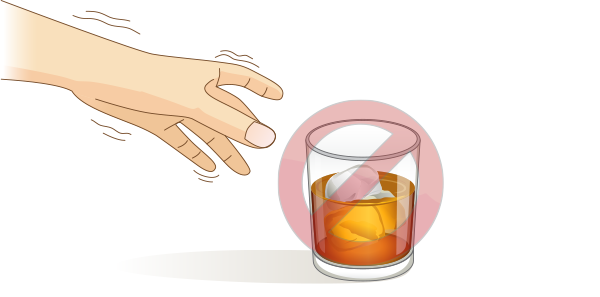
Use oral benzodiazepines in stable patients with mild withdrawal who are not vomiting (diazepam 5–10 mg by mouth for CIWA-Ar score 10–20). Use IV benzodiazepines allowing faster onset and easier titration in patients with severe withdrawal as these patients are at a higher risk of seizure (diazepam 10–20 mg IV for CIWA-Ar score greater than 20). Assess for response every five minutes in severe alcohol withdrawal, and repeat dosages as necessary. Some protocols suggest escalating dosages of diazepam by 10 mg every five minutes to a maximum of 40 mg per dose.8
Explore This Issue
ACEP Now: Vol 37 – No 09 – September 2018There is no evidence that phenobarbital is superior to benzodiazepines for preventing complications of alcohol withdrawal.9,10 While debate continues regarding the equivalency of phenobarbital and benzodiazepines, I do not recommend using phenobarbital alone for treatment of alcohol withdrawal, but consider its use as an adjunct with benzodiazepines after the patient has received the equivalent of 200 mg of diazepam and is still in severe withdrawal.
It is strongly discouraged that patients be provided a takeaway supply or prescription for benzodiazepines. The long half-life of diazepam will protect patients from developing serious symptoms of withdrawal, and if adequately treated in the emergency department, no additional medications will be required. Patients who are discharged from the emergency department with a prescription for benzodiazepines may be at increased risk for sedative overdose, drug-seeking behavior, and dependence.
4. Provide a pathway to support patients who are trying to quit.
Many patients in the emergency department with alcohol withdrawal are in a vulnerable state and may be ready to quit drinking. This is an opportune time for them to take the first steps on the pathway to recovery. I recommend counseling all ED patients whom you have treated for alcohol withdrawal by stating, “You need help for your serious alcohol problem. You can’t do it on your own. There are effective treatments available to you. With treatment, the way you feel, your mood, social relationships, and work will be profoundly better.”
Provide several options to patients and consider starting patients who are interested in quitting on anti-craving medications such as naltrexone. Naltrexone blocks the release of endogenous endorphins, which are thought to be released during alcohol consumption, leading to positive reinforcement effects. Naltrexone, 50 mg by mouth once daily, has been shown to significantly reduce the rate of relapse as well as heavy drinking days.11
Thanks to Dr. Bjug Borgundvaag, Dr. Sarah Gray, and Dr. Meldon Kahan for their expert contributions to the podcast that inspired this article.
References
- Cherpitel CJ, Ye Y. Trends in alcohol- and drug-related emergency department and primary care visits: data from four U.S. national surveys (1995-2010). J Stud Alcohol Drugs. 2012;73(3):454-458.
- Miller F, Whitcup S, Sacks M, et al. Unrecognized drug dependence and withdrawal in the elderly. Drug Alcohol Depend. 1985;15(1-2):177-179.
- Schomerus G, Lucht M, Holzinger A, et al. The stigma of alcohol dependence compared with other mental disorders: a review of population studies. Alcohol Alcohol. 2011;46(2):105-112.
- Mayo-Smith MF, Beecher LH, Fischer TL, et al. Management of alcohol withdrawal delirium. An evidence-based practice guideline. Arch Intern Med. 2004;164(13):1405-1412.
- Reoux JP, Miller K. Routine hospital alcohol detoxification practice compared to symptom triggered management with an Objective Withdrawal Scale (CIWA-Ar). Am J Addict. 2000;9(2):135-144.
- Gray S, Borgundvaag B, Sirvastava A, et al. Feasibility and reliability of the SHOT: a short scale for measuring pretreatment severity of alcohol withdrawal in the emergency department. Acad Emerg Med. 2010;17(10):1048-1054.
- Amato L, Minozzi S, Vecchi S, et al. Benzodiazepines for alcohol withdrawal. Cochrane Database Syst Rev. 2010;3:CD005063.
- Morgenstern J. Management of delirium tremens. First 10 EM site. Accessed Aug. 21, 2018.
- Hendey GW, Dery RA, Barnes RL, et al. A prospective, randomized, trial of phenobarbital versus benzodiazepines for acute alcohol withdrawal. Am J Emerg Med. 2011;29(4):382-385.
- Rosenson J, Clements C, Simon B, et al. Phenobarbital for acute alcohol withdrawal: a prospective randomized double-blind placebo-controlled study. J Emerg Med. 2013;44(3):592-598.
- Maisel NC, Blodgett JC, Wilbourne PL, et al. Meta-analysis of naltrexone and acamprosate for treating alcohol use disorders: when are these medications most helpful? Addiction. 2013;108(2):275-293.
Pages: 1 2 3 4 | Single Page




No Responses to “4-Step Approach to Treating Alcohol Withdrawal”